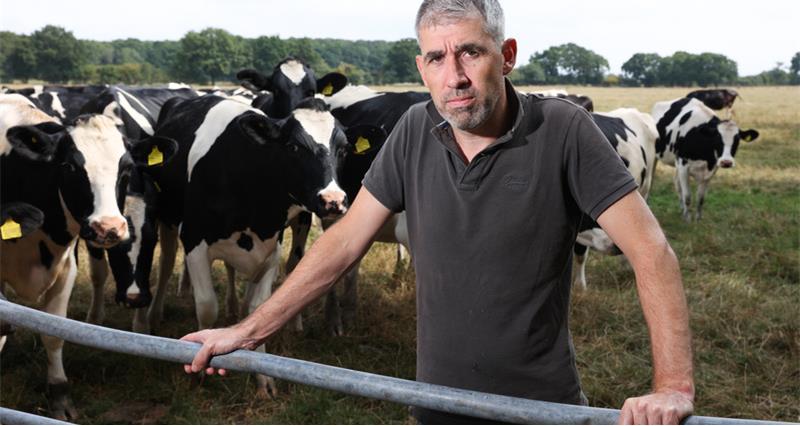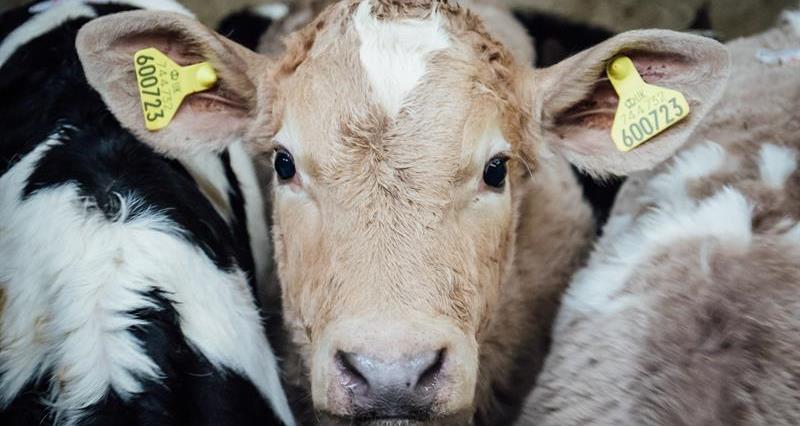In a joint letter to the Prime Minister, the NFU and Dairy UK warn that increased US access to our food and drinks market risks destabilising UK markets, weakening domestic food security, undermining domestic standards and ultimately reducing the viability and profitability of many dairy farms.
The letter, sent ahead of US President Donald Trump’s state visit to the UK this week, accompanies a new NFU report – Supporting UK dairy farming in the context of the UK-US economic prosperity deal – which sets out the differences between UK and US when it comes to economies of scale, production systems, welfare standards and attitudes to medicine usage and environmental obligations.��
It also looks at the monetary support accessible to US dairy farmers, such as through federal milk marketing programmes, which is not replicated for UK farmers.
NFU Dairy Board Chair Paul Tompkins said: ““British dairy is a huge success story and our ambition to grow the value of our sector is strong, making us natural partners in the government’s growth agenda. What sets our system apart is the weight we place on animal welfare, traceability and environmental care.
“As part of this, we have built a reputation of trust and confidence with shoppers, a fact echoed in the latest�� Farmer Favourability Survey which found that more than three quarters of the people surveyed trust British food more than food from the rest of the world. This is something we cannot take for granted.
“Farmers in the US operate under very different constraints. US dairy is produced on a vast scale under different regulatory regimes.
“Increased access for food imports which are not produced to the same high standards as we adhere to will not only erode the confidence of the public but will put UK dairy farming businesses at a competitive disadvantage.
“UK farming can give no further concessions without suffering serious impacts to its viability and profitability.”
NFU Dairy Board Chair Paul Tompkins��
Dairy sector not a bargaining chip
“It is vital that the UK maintains its existing tariff protections when it comes to critical agricultural sectors. We have made that abundantly clear in our letter to the Prime Minister.
“The UK cannot continue to barter away domestic food security in pursuit of tariff reductions in other sectors which may never materialise, and which could simply take us back to the status-quo pre “Liberation Day.”
“Successive trade deals with New Zealand, Australia and lately India have already seen significant access given to the UK’s highly valued dairy market. The future cumulative impact of these trade deals, in such a dynamic global trading environment, cannot be ignored. ����
“UK farming can give no further concessions without suffering serious impacts to its viability and profitability. Any increased access given to the US in the Economic Prosperity Deal currently under negotiation could put our domestic dairy sector at risk.
“Both the NFU and Dairy UK urge the Prime Minister to hold firm.”
Dr Judith Bryans, Chief Executive of Dairy UK, added: “British dairy farmers and processors deliver world-class, nutritious products every day, produced to some of the highest welfare and environmental standards in the world. This success cannot be put at risk by a rushed or unbalanced trade deal that leaves our sector exposed to unfair competition from imports, produced under very different conditions.
“If UK dairy is to thrive as part of the government’s growth agenda and we are to protect our own food security, all future agreements have to be fair, balanced and protect both consumer confidence and the long-term viability of our farmers and businesses.”��
Key asks of government
�ʼһ���is clear that increased US access to our food and drinks markets could destabilise UK markets, weaken food security, undermine domestic standards and ultimately reduce farm viability. Read: NFU warns agriculture has ‘nothing more to give’ on US trade
With global demand for dairy increasing, UK dairy, with its global reputation for safe, traceable, high quality and sustainably produced products, is in a strong position to realise growth opportunities and offensive trading interests.
However, any UK-US deal which reduces tariffs on dairy imports could undermine the UK dairy sector’s ability to realise those opportunities
The report – Supporting UK dairy farming in the context of the UK-US Economic Prosperity Deal – is a lobbying tool for the NFU when speaking to MPs and trade contacts in government. It clearly sets out the NFU’s asks on trade, which include:��
- In the UK-US negotiation, UK agriculture has already shouldered the burden on behalf of other sectors of the economy and must not be used as a bargaining chip in negotiations. We have nothing more to give. Our domestic food security and supply must be safeguarded.
- The interests of the UK agri-sector must be central to negotiations.
- Domestic standards must be protected and supported in all trade negotiations. Government must urgently convene a taskforce to establish a set of core production standards that apply to both domestically produced and imported food sold in the UK.
- Government must commit to undertaking annual reviews of the cumulative impact of all trade deals and partnerships on the agri-sector to prevent disruption to domestic markets.
- Our most financially valuable trading relationships must be prioritised, which gives the EU significant importance.
- Consumer trust and confidence in food standards must be maintained.��
��
UK and US dairy sectors – at a glance
| Comparison of standards | ||
| �� | UK | US |
| Antibiotic use |
In the UK, sales of antibiotics for food-producing animals have fallen by 59% since 2014 and sales of antibiotics of highest critical importance to human health now account for less than 0.5% of total veterinary antibiotic sales. The UK has tighter controls on the use of antibiotics and the routine preventative use of them is being phased out. |
There is no federal legislation controlling use of antibiotics in food production animals or aimed at lowering the use of critically important antibiotics. The intensive systems of American production are reliant on the prophylactic use of antibiotics, especially macrolides and tetracyclines which are important for human health. |
| Welfare requirements | The UK’s Animal Welfare Act covers all livestock keepers. In addition, there are species specific codes of practice and industry-led welfare strategies.
Over 97% of all milk production in the UK is produced by Red Tractor-assured dairy farmers. Retailers and many dairy processors have additional schemes of their own which augment welfare standards further. |
There is no federal legislation on animal welfare for farmed animals, with rules determined at state level. Many state level animal welfare provisions exempt farm animals. This means there is room for significant variability in animal welfare conditions across the country.�� |
| Livestock transport |
A limit of 8 hours.�� Longer journey times (up to 14 hours for cattle) can be undertaken if the vehicle is approved and meets additional standards under the APHA (or equivalent in devolved regions) Vehicle Approval Scheme. |
US Federal legislation on the transport of livestock requires they are fed, watered and rested every 28 hours. |
| SPS requirements |
Growth hormones are banned. Cloning for food production is�� |
Bovine Somatotropin (BST), a growth hormone, is allowed and accounts for ~2%5 of milk production or ~4.5bn pounds or ~2.05bn litres of milk. Animal Cloning is allowed, although its use is limited. |
| Tethered cattle |
Banned by Red Tractor, which covers 97% of UK dairy farms |
Still allowed, alongside pipeline milking (as opposed to milking parlour). 39% of US dairy farms use tie-stall facilities as their primary housing type (USDA, 2016; CDIC, 2019) 73% of tie-stall farms in the US offer pasture access for at least part of the year6. |
| Commercial comparison of production and scale | ||
| �� | UK | US |
| Number of herds | ~ 10,000 active dairy farms in 2025 | 26,290 in 2023 |
| Average herd size | 165 |
The Agricultural Resource Management Survey (ARMS) found that the average surveyed farm had 283 cows in 2021, whilst the midpoint dairy herd size was 1,260 (i.e. 50% of dairy cows in the US were on farms milking more than 1,260 cows). Large dairy farms with 2,000+ cows account for about 3% of the farms in the US, but carry 40% of the US milking herd population. |
| Annual milk production | 15bn litres in 2024/25 season = just under 27.5billion pounds |
226.4 billion pounds of milk produced in 2022 = 102.6bn litres. (USDA, NASS, 2024). |
| Yield | ~8,200 |
~10,000 The average number of pounds of milk produced per cow per year by US dairy cows was 24,117 in 2023, an increase of 29% since 2003. |
| Average acres operated | 208 | 483 |
| % of milk production from organic | ~3% | 2.89% |
| Overview of government support systems | ||
| �� | UK | US |
| Government support |
No “end-use” linked marketing system. No insurance schemes underwritten by government. Limited capital grant schemes available. “Payment-for-goods” style environmental schemes. |
Yes, including:��
|
��



